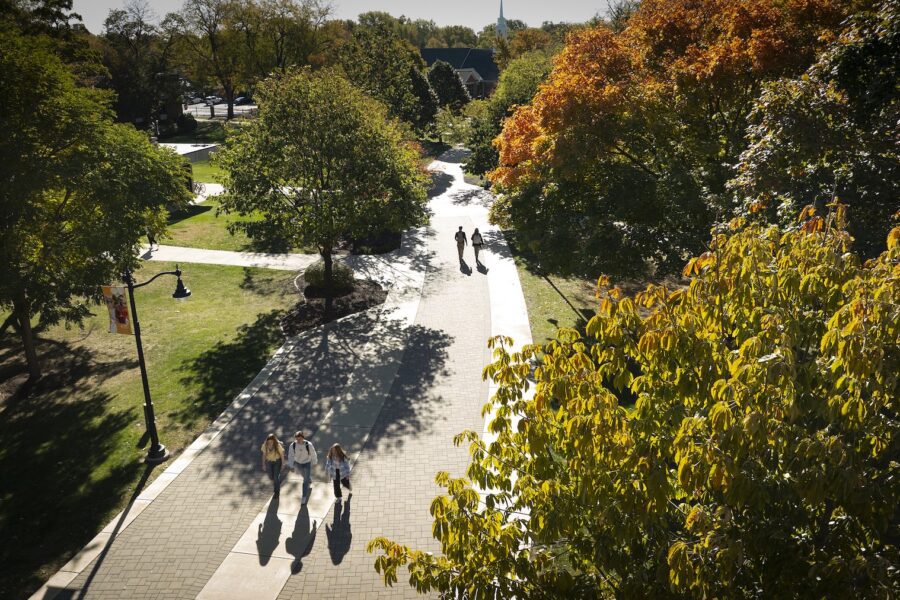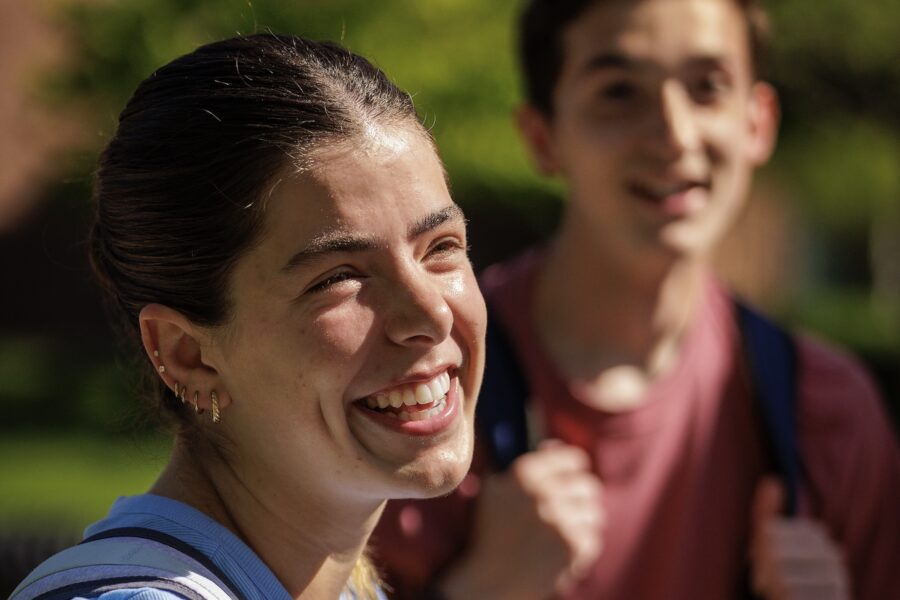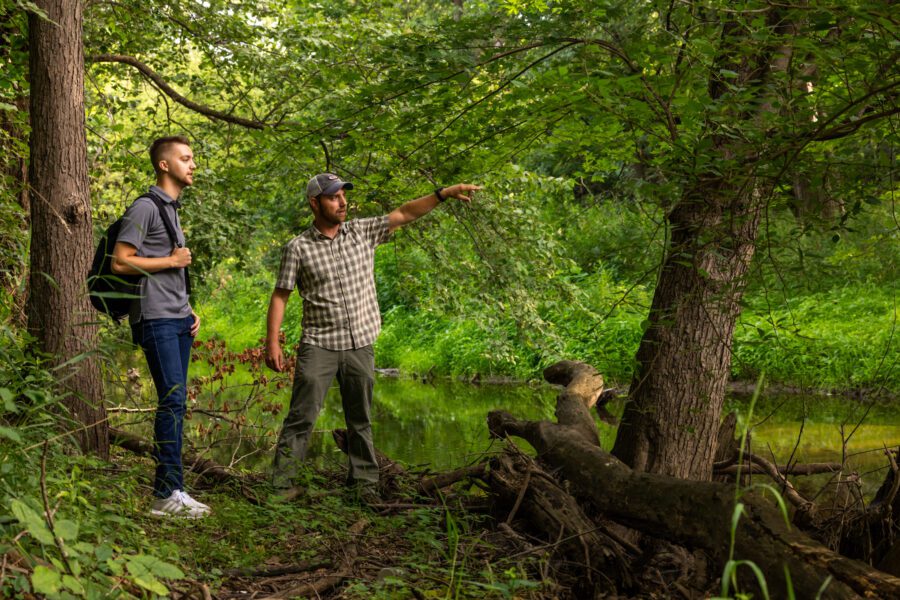
“A bald eagle!”
Someone pointed, and we all looked up from our canoes. There it was, perched with an almost obliging majesty on the very highest branch of an enormous tree overhanging the river. We were several faculty members, family and friends canoeing down the Kankakee River to Olivet’s new nature sanctuary. So far, the day had been anything but disappointing. The sun slanted over the wide river, dragonflies darted back and forth, and the banks were overhung with trees.
We had set out from Island Park in Momence, a small town on the Kankakee River just 10 miles down the road from Olivet’s campus. From Momence, it is an easy 40-minute float downstream to our destination: the Swanberg Sanctuary, a 100-acre tract of land along the river recently donated to Olivet as a nature preserve, research station and teaching tool already being utilized by several classes.
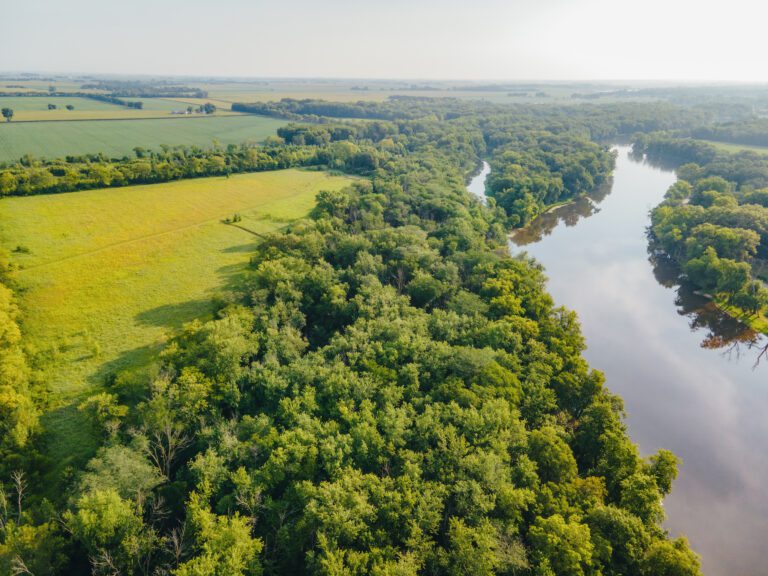 Once we passed beyond Momence, the right bank of the river became a tangle of forest. “Are those Kankakee mallow?” someone asked, referring to a local plant so endangered it grows naturally on only a single river island. “No,” explained Dr. Derek Rosenberger, zoology professor, co-director of the Sanctuary and our guide for the day. “That’s just wild hibiscus.”
Once we passed beyond Momence, the right bank of the river became a tangle of forest. “Are those Kankakee mallow?” someone asked, referring to a local plant so endangered it grows naturally on only a single river island. “No,” explained Dr. Derek Rosenberger, zoology professor, co-director of the Sanctuary and our guide for the day. “That’s just wild hibiscus.”
The Sanctuary lies along three-quarters of a mile of river and gives a hint of the splendor of the now- vanished Grand Kankakee Marsh, thousands of square miles of wetlands that once stretched across northern Illinois and Indiana. Now, only pockets of this wilderness remain. We turned our canoes up a lazy backwater — the water so clear we could see the sandy river bottom below our paddles — and kept our eyes peeled for the white-tailed deer, beaver, foxes, river otters and rare freshwater mussels we knew were still plentiful here.
In 2008 Kankakee County residents Dale and Tracy Swanberg purchased the Sanctuary property. That year, they began a professional restoration process, restoring land previously farmed for corn and soybeans to its original habitat. They donated it to Olivet in 2022, with the hope it would be used “for educational purposes as well as to benefit the community” and trusting the University to “continue to enhance the land and continue on the path to return it to its native condition.” By this time, the property contained wetland, prairie, savanna and riparian forest — multiple distinct ecosystems and a trove of research and educational opportunities for the students and professors of Olivet’s thriving environmental science and zoology programs (the latter of which is one of the largest among Christian colleges).
Already, Dr. Rosenberger and Dr. David Hoekman, biology professor and co-director of the Sanctuary, have begun several projects at the Sanctuary with students from their Conservation Biology, Animal Behavior, Ecology, Ornithology and Invertebrate Zoology classes. Students have been at work tracking animal populations with trail cams, quantifying the plant and animal biodiversity of the site, and conducting surveys of insect species. Just 10 minutes away from campus (for those who choose to travel by car instead of canoe), the Swanberg Sanctuary represents an ecological resource few other Christian universities can rival. 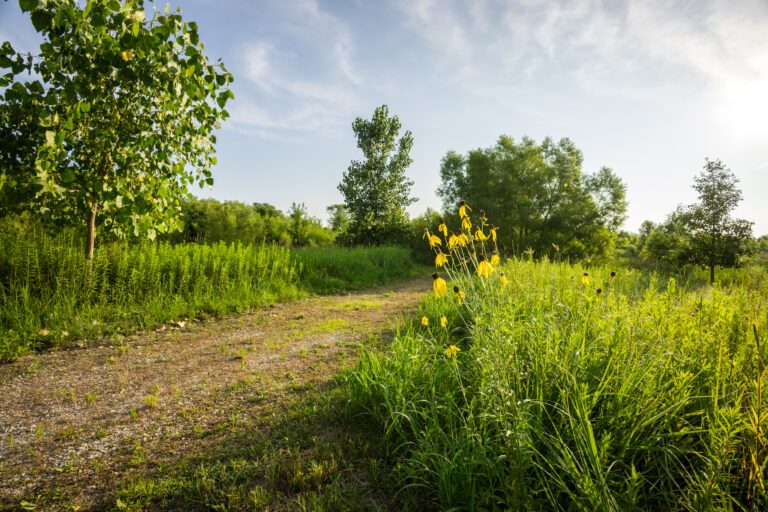
“Just as schools prefer teachers with classroom experience and hospitals prefer nurses with clinical experience, so, too, do conservation and field biology organizations prefer candidates with experience in the field,” Dr. Rosenberger says. “These sites get our students out of the classroom and lab and into the dynamic setting in which they hope to work.”
In addition, he adds, they also “demonstrate to our students and our community our commitment to caring for God’s good creation.”
The Swanberg Sanctuary is simply the latest and most significant of a host of rich research opportunities offered by Olivet’s location in the midst of the Illinois prairie. First and foremost, Olivet’s main campus is located just over a mile from the Kankakee River itself. Dr. Charles Carrigan ’96, director of the University’s Earth and space sciences program, cultivates students’ connection with the river by leading the Olivet River Keepers, a student organization dedicated to care and conservation of the Kankakee. Over the past several years, Dr. Carrigan has led teams of dozens of students on an annual river cleanup, in which students get hands-on experience contributing to the health of the local ecosystem.
Olivet is also located within easy driving distance of two unique ecological treasures. The 20,000-acre Midewin National Tallgrass Prairie, where students have conducted research on pollinators and species diversity (since published in the scientific journal Insect Conservation and Diversity), is just 30 minutes to the northwest and composes the largest restored prairie in the region. In the other direction, 30 minutes to the east of campus, lies the Pembroke black oak savanna, one of the country’s most critically endangered ecosystems. Here, students have conducted research on redheaded woodpeckers, which depend on the endangered ecosystem for their habitat, and an almost unknown species of beetle. Together with the Swanberg Sanctuary, these make Olivet the ideal site for students who want field experience in preparation for a career in zoology or conservation — or who simply want to appreciate God’s glory through the created world.
In addition, students and faculty are working to bring restored ecosystems to Olivet’s campus itself. For the past four years, Dr. Rosenberger has overseen the transformation of 2 1/2 acres of lawn 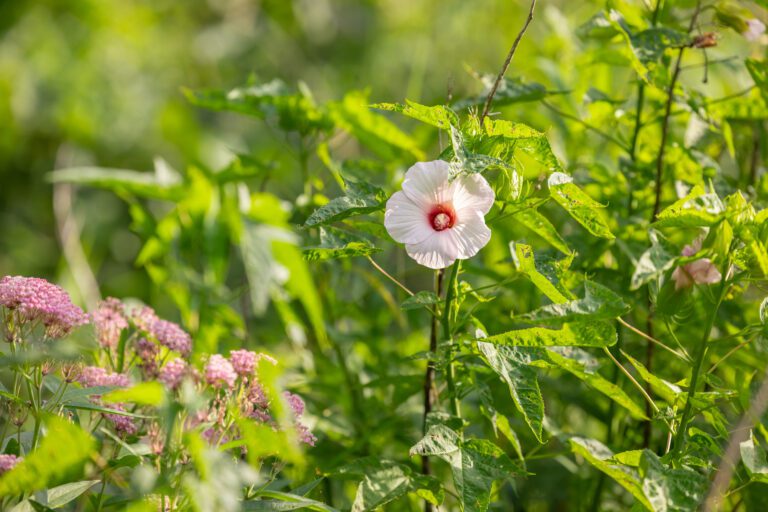 on campus to a restored prairie of native grasses. Students have been engaged with every step of this process, from selecting the mix of seeds to planting to composing species lists now that the prairie is growing to comparing its biodiversity with the nearby Perry Farm prairie.
on campus to a restored prairie of native grasses. Students have been engaged with every step of this process, from selecting the mix of seeds to planting to composing species lists now that the prairie is growing to comparing its biodiversity with the nearby Perry Farm prairie.
The Grand Kankakee Marsh is gone — drained over a century ago and converted to farmland. And of the thousands of miles of prairie that originally covered Illinois, thick with biodiversity, only 0.1% remains — the rest replaced with monocultures of corn, soy or lawn. This means that sanctuaries such as ecological reservoirs are essential not only for educating students on the interrelationship of species in God’s good garden and giving them experience of the beauty of creation but also for offering an opportunity to participate in its restoration. Students come to Olivet to live, learn and work in community. And because Olivet is a college by the river in the midst of the (almost entirely) vanished grand Illinois prairie, an important aspect of that community life is preserving and knowing the landscape in which we are rooted and will grow.
Weeks after the faculty canoe trip to the Swanberg Sanctuary, some of us repeated it again, this time with 30 freshman Honors Program students who had just arrived on campus for the start of their Olivet experience. As we unloaded our canoes at the Sanctuary and prepared for a hike through the prairie, I asked the students whether they had seen any bald eagles.
Several of them nodded, grinning from ear to ear.
From Olivet The Magazine, On Purpose – Winter 2024. Read the full issue HERE.


